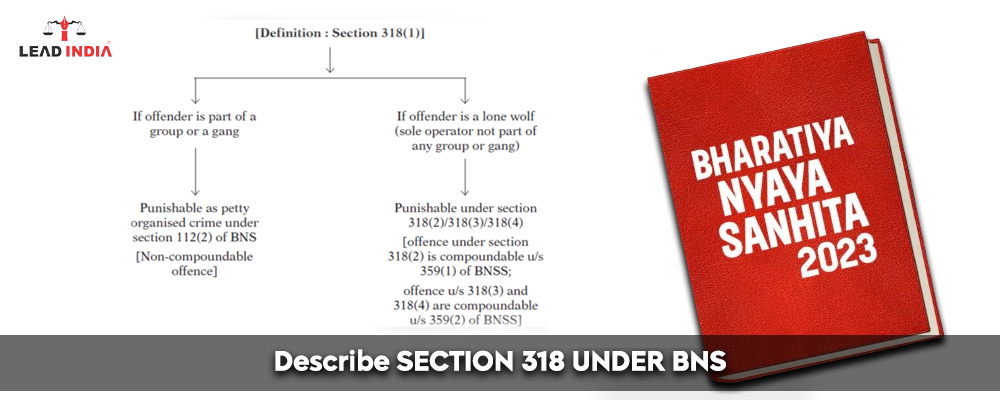Cheating, in its widest definition, encompasses a variety of actions meant to break the law for one’s own unfair advantage. Since the rules that are broken can be explicit or stem from an unwritten code of behaviour based on morality or norms, cheating can be recognized.
Section 318 under BNS
- Section 318 under BNS defines cheating.
- The penalties for severe kinds of deception, as defined by Sections 318(2) and 318(3) of BNS, include dishonestly coercing the person being deceived into delivering property or tampering with valuable security. The individual who has been duped under this clause is
- Forced to provide anything to someone else, or create, modify, or destroy a valuable security in whole or in part, or something that is sealed, signed, and able to be turned into a valuable security
- When a property is delivered or inducements are made, there must be a guilty intention present.
Need A Legal Advice
The internet is not a lawyer and neither are you. Talk to a real lawyer about your legal issue

Section 318 under BNS: Essential Elements
In order to prove the crime of cheating under Section 318 of BNS by coercing someone into delivering property, the following components must be proven:
- The person’s assertion has to be untrue.
- The accused knew that the statement he made was untrue and false.
- The accused made malicious and willful false statements with the goal of misleading the recipient.
- The act in which the accused coerced the subject into giving the object, acting in a way that the subject otherwise would not have, or not acting at all.
- Mens rea, a legal term that describes a person’s mental state or condition at the time of committing a crime and is the motivation behind every crime, must exist. It is a precise, prearranged, and expected purpose to carry out a particular deed.
Section 318 of BNS Punishment
- Under Section 318(2) of BNS, any individual found guilty of cheating faces a maximum sentence of three years in prison of any kind, a fine, or both.
- Under Section 318(3) of BNS, anyone who engages in cheating knowing that doing so will likely result in unjust loss to someone whose interest in the transaction to which the cheating is related, which he was obligated to keep private by law or under a contract, might be punished with up to five years in jail, a fine, or both.
Understanding Section 318 of BNS Punishment
- Intensity of the Offense: A significant consideration in determining the term of imprisonment was the seriousness of the crime committed. The implications will likely be greater if the crime includes a substantial sum of money, property, or both, and the person who is attacked actually suffers from the crime.
- Repeat offenders: harsher punishments will probably be imposed on those who repeat offenses. The court may consider the offender’s prior conviction for a comparable crime when imposing a sentence.
- Mitigating elements: The court might additionally consider any mitigating elements when determining the correct punishment. A few of these may include the culprit’s age, health, past, and efforts to make reparations to the person who was hurt.
- Exacerbating Factors: A more serious penalty could be imposed in any exacerbating scenario. These might include the use of physical force, including threats, the presence of more people in the crime, or the utilization of innovative techniques.
Section 318 of the BNS has done a great job of discouraging and penalizing incidents of dishonesty and cheating, even though revisions and changes are still necessary. Section 318 of BNS has shown itself to be resilient throughout history, from the creation of the IPC to the rise in popularity of the phrase “chaar sau bees” to cyberfrauds and cutting-edge techniques of cheating in the twenty-first century.
One can talk to a lawyer from Lead India for any kind of legal support. In India, free legal advice online can be obtained at Lead India. Along with receiving free legal advice online, one can also ask questions to the experts online free through Lead India.





 Talk to a Lawyer
Talk to a Lawyer